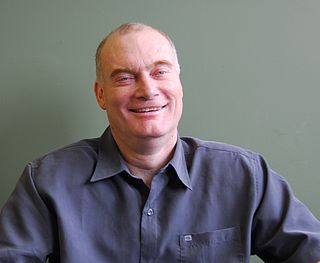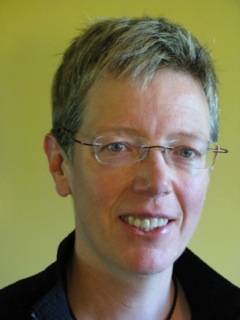Related Research Articles

Accessibility is the design of products, devices, services, vehicles, or environments so as to be usable by people with disabilities. The concept of accessible design and practice of accessible development ensures both "direct access" and "indirect access" meaning compatibility with a person's assistive technology.
Universal design is the design of buildings, products or environments to make them accessible to people, regardless of age, disability or other factors. It addresses common barriers to participation by creating things that can be used by the maximum number of people possible. Curb cuts or sidewalk ramps, which are essential for people in wheelchairs but also used by all, are a common example of universal design.

Rehabilitation counseling is focused on helping people who have disabilities achieve their personal, career, and independent living goals through a counseling process.
Inclusive entrepreneurship is about a set of attitudes, competences and skills which allow people to turn their dreams into concrete projects or “enterprises” and then see these through to fruition. It is about more than starting an individual business. Inclusive entrepreneurship can be applied to self-employment, starting or growing micro or small enterprises and to social enterprise using business based approaches driven by social mission. Indeed, the personal qualities required for entrepreneurship are essential for success in the knowledge economy – whether this be in the private or public sectors.
EQUAL was a Community Initiative within the European Social Fund of the European Union. It concerned “transnational co-operation to promote new means of combating all forms of discrimination and inequalities in connection with the labour market”. It ran from 2001 till 2007 with a budget of some €3 billion of EU resources, matched by a similar sum from national resources.
Supported employment refers to service provisions wherein people with disabilities, including intellectual disabilities, mental health, and traumatic brain injury, among others, are assisted with obtaining and maintaining employment. Supported employment is considered to be one form of employment in which wages are expected, together with benefits from an employer in a competitive workplace, though some versions refer to disability agency paid employment. Companies such as Skilcraft in the United States are an example of "supported employment" which is defined in law for state and federal reimbursements.

Humanitarian Accountability Partnership International, established in 2003, was the humanitarian sector's first international self-regulatory body. A multi-agency initiative working to improve the accountability of humanitarian action to people affected by disasters and other crises, HAP members ranged from organisations with a mandate for emergency relief and development activities to institutional donors. The organisation aimed to strengthen accountability towards those affected by crisis situations and to facilitate improved performance within the humanitarian sector. The ultimate goal of the organisation was to uphold the rights and the dignity of crisis-affected populations across the world.
Swisscontact – Swiss Foundation for Technical Cooperation is a Swiss non-profit-organisation, which carries out projects aiming at reducing poverty in developing and transition countries by private sector development. It has been founded in 1959 as a politically and denominationally neutral organisation and has 60 employees in Switzerland and approximately 1,400 staff abroad. The main fields of activity are fostering skills development, small and medium enterprises, financial services and resource efficiency.
Design for All in the context of information and communications technology (ICT) is the conscious and systematic effort to proactively apply principles, methods and tools to promote universal design in computer-related technologies, including Internet-based technologies, thus avoiding the need for a posteriori adaptations, or specialised design.
The International Assistance Mission (IAM) is the longest continually serving non-profit organisation in Afghanistan. They are a well-respected NGO working to improve lives and build local capacity in health, development and education. They are a partnership between the people of Afghanistan and international Christian volunteers, who have been working together since 1966. IAM is registered in Geneva, Switzerland, and is the longest continuously serving NGO in Afghanistan, and only works in Afghanistan.

Vocational rehabilitation, also abbreviated VR or voc rehab, is a process which enables persons with functional, psychological, developmental, cognitive, and emotional disabilities, impairments or health disabilities to overcome barriers to accessing, maintaining, or returning to employment or other useful occupations.

Dr. Gary Birch, is a Canadian Paralympian, an expert in brain–computer interface (BCI) technology and executive director of the Neil Squire Society. In 1975, Dr. Birch was involved in an automobile accident which resulted in injuries to the C6 and C7 area of his spine making him a low-level quadriplegic. He was one of the original players of Murderball, and won several medals in the 1980 Summer Paralympics in the Netherlands. In 2008, he was appointed an Officer of the Order of Canada. He continues to champion accessibility through his Research and Development work in assistive technologies at the University of British Columbia, the Rick Hansen Institute, and the Neil Squire Society.
Community integration, while diversely defined, is a term encompassing the full participation of all people in community life. It has specifically referred to the integration of people with disabilities into US society from the local to the national level, and for decades was a defining agenda in countries such as Great Britain. Throughout recent decades, community integration programs have been increasingly effective in improving healthcare access for people with disabilities. They have been valued for providing a "voice for the voiceless"
The European Quality in Social Services (EQUASS) is an integrated sector-specific quality certification system that certifies compliance of social services with European quality principles and criteria. EQUASS aims to enhance the social sector by engaging service providers in quality and continuous improvement and by guaranteeing service users quality of services throughout Europe.
The Banyan is a non-governmental organization based in Chennai, India that was founded in 1993 by Vandana Gopikumar and Vaishnavi Jayakumar to cater to mentally-ill and homeless women in the city.

Jutta Treviranus is a full Professor at the Ontario College of Art and Design University (OCADU) in Toronto, Canada. She is the director and founder of the Inclusive Design Research Centre (IDRC) and the Inclusive Design Institute (IDI).
Temasek Foundation International is a Singapore-based non-profit organisation under the philanthropic arm of the Singapore state sovereign fund Temasek Holdings. Temasek has established 17 endowments since 1974, focused on promoting social and cultural interaction, education, and aid for the disadvantaged in Asia.
The Social Welfare Department is a department of the Hong Kong Government responsible for providing welfare services to the community.
TVET refers to all forms and levels of education and training which provide knowledge and skills related to occupations in various sectors of economic and social life through formal, non-formal and informal learning methods in both school-based and work-based learning contexts. To achieve its aims and purposes, TVET focuses on the learning and mastery of specialized techniques and the scientific principles underlying those techniques, as well as general knowledge, skills and values.
The Ghana Education Service (GES) is a government agency under the Ministry of Education responsible for implementing government policies that ensure that Ghanaians of school-going age irrespective of their ethnicity, gender, disability, religious and political dispositions receive quality formal education. The Ghana Education Service is governed by a fifteen-member council called the GES council.
References
- ↑ "About Us > EPR – European Platform for Rehabilitation". Platform of European Social NGOs (socialplatform.org). Retrieved 20 September 2011.
- ↑ "The High Level Group on Disability". European Commission (ec.europa.eu). Retrieved 20 September 2011.
- ↑ "The ATIS4all collaborative portal" . Retrieved 20 September 2011.[ permanent dead link ]